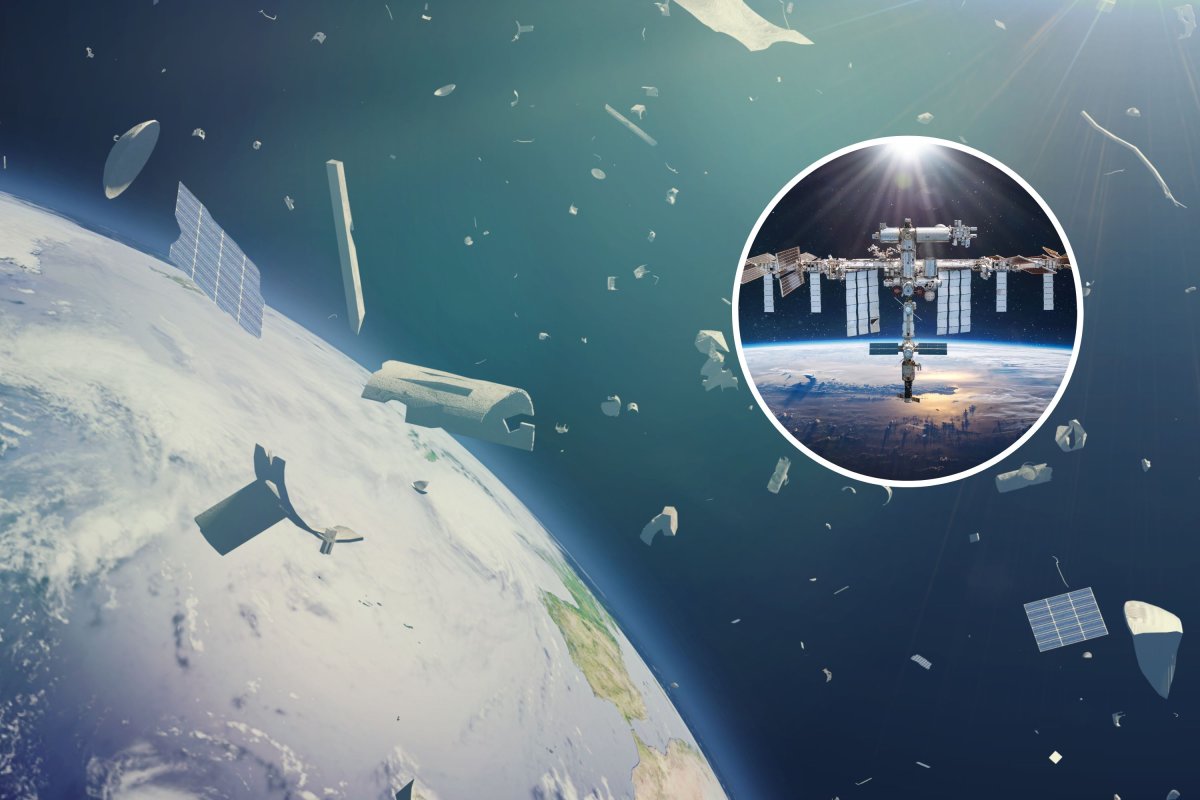A chunk of space debris that came crashing down through the ceiling of a home in Florida may have come from the International Space Station (ISS).
Naples local Alejandro Otero shared pictures of the object on X, formerly Twitter, on March 15 in response to a post by astrophysicist Jonathan McDowell, about a chunk of space debris reentering the atmosphere on March 8 over Florida.
"The EP-9 equipment pallet reentered at 1929 UTC over the Gulf of Mexico between Cancun and Cuba. This was witih [sic] the previous prediction window but a little to the northeast of the 'most likely' part of the path. A couple minutes later reentry and it would have reached Ft Myers," McDowell posted to X.
"Looks like one of those pieces missed Ft Myers and landed in my house in Naples," Otero replied. "Tore through the roof and went thru 2 floors. Almost his [sic] my son."
Hello. Looks like one of those pieces missed Ft Myers and landed in my house in Naples.
— Alejandro Otero (@Alejandro0tero) March 15, 2024
Tore through the roof and went thru 2 floors. Almost his my son.
Can you please assist with getting NASA to connect with me? I’ve left messages and emails without a response. pic.twitter.com/Yi29f3EwyV
The cylindrical piece of debris weighed nearly 2 pounds and measured a few inches long. According to McDowell, the object may have been one of nine batteries discarded from the ISS in 2021, as a Japanese space agency JAXA cargo pallet carrying these batteries reentered the Earth's atmosphere above the Gulf of Mexico at around the same time.
NASA has now collected the piece of debris and will soon confirm if it is indeed from the ISS.
"NASA collected an item in cooperation with the homeowner, and will analyze the object at NASA's Kennedy Space Center in Florida as soon as possible to determine its origin," NASA said in a statement to Agence France-Presse (AFP) on Tuesday. "More information will be available once the analysis is complete."

There are thousands and thousands of pieces of space debris in orbit around the Earth, ranging from dead satellites to tiny specks left over from collisions. According to the European Space Agency (ESA), there are about 11,500 tonnes of objects in orbit, comprised of around 36,500 pieces of space debris greater than 4 or so inches, and millions more smaller pieces.
"More than 15,000 satellites have been placed in Earth orbit since the first satellite, Sputnik 1, was orbited by the Soviet Union on October 4, 1957. That satellite reentered after only three months," Mark Rigby, an adjunct research fellow for the Centre of Astrophysics at Australia's University of Southern Queensland and past curator of the country's Sir Thomas Brisbane Planetarium in Brisbane, previously told Newsweek. "The number of satellites in Earth orbit has increased dramatically in recent years, due mainly to SpaceX and its Starlink communications satellites in Low Earth Orbit."
According to website Orbiting Now, there are 9,684 satellites orbiting the Earth currently, 8,232 of which are in Low Earth Orbit.
When space debris eventually falls toward Earth, it usually burns up as a result of the intense heat generated by friction with the atmosphere.
"Most satellites are intentionally sent to 'burn up' in the atmosphere at the end of their useful life. During reentry most of the metals vaporize," Daniel Murphy, a research chemist at the NOAA Chemical Sciences Laboratory, told Newsweek.
However, larger chunks of junk may survive the fall, colliding with the Earth and wreaking havoc in their wake.
"While the chances are still very good that the remains will land in the ocean, there is a non-zero chance of the debris striking somewhere on the ground," Wendy N. Whitman Cobb, a professor of strategy and security studies at Air University, previously told Newsweek. "When Skylab, the U.S.'s first space-station program, was deorbited, some of its debris landed in Australia. More recently, some parts of SpaceX's Falcon 9 rockets have been found in Brazil. So, while there isn't a high chance of debris striking people or property, it's not completely absent either."
Do you have a tip on a science story that Newsweek should be covering? Do you have a question about space junk? Let us know via science@newsweek.com.
Uncommon Knowledge
Newsweek is committed to challenging conventional wisdom and finding connections in the search for common ground.
Newsweek is committed to challenging conventional wisdom and finding connections in the search for common ground.
About the writer
Jess Thomson is a Newsweek Science Reporter based in London UK. Her focus is reporting on science, technology and healthcare. ... Read more





